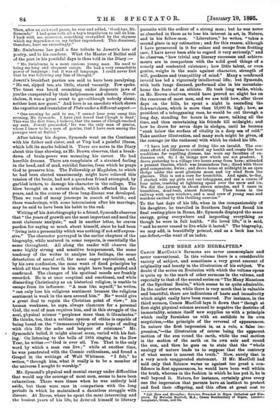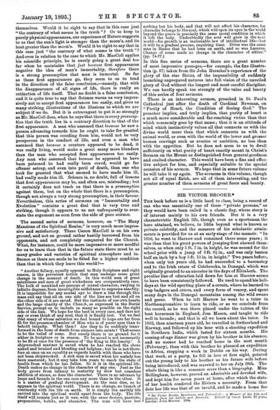LIFE HERE AND HEREAFTER.*
CANox MAcCoLL's Sermons are never commonplace and never conventional. In this volume there is a considerable variety of subject, and sometimes a very great amount of originality and beauty in the illustration of his subject. We doubt if the series on Evolution with which the volume opens is quite up to the mark of other sermons in the volume, and especially to that of the second series on "The Many Mansions of the Spiritual Realm," which seems to us quite admirable. In the earlier series, while there is very much that is valuable and beautiful, there are indications of haste and immaturity which might easily have been removed. For instance, in the third sermon, Canon MacColl lays it down that "though at first sight physical science seemed to negative the doctrine of immortality, science itself now supplies us with a principle which really furnishes us with an antidote to its own scepticism,—the principle of the reversal of appearances. In nature the first impression is, as a rule, a false im- pression,"—the illustration of course being the apparent motion of the sun round the earth, while the real motion is the motion of the earth on its own axis and round the sun, and then he goes on to state that the "whole analogy of nature leads us to suppose that the contrary of what seems is nearest the truth." Now, surely that is a very much exaggerated statement. If Mr. MacColl had said only that Science warns us against too great a con- fidence in first appearances, he would have been well within the truth, whereas in the fashion in which he has put it, he is well beyond it. Nature, for instance, certainly gives every one the impression that parents have an instinct to protect and feed their offspring, and this often at great cost to- • Life Here and Hereafter: Sermons Preached in Ripon Cathedral and Else- where. By Malcolm MieColl, M.d. Canon Residentiary of Ripon, London: Longman', Green, and Co.
themselves. Would it be right to say that in this case just "the contrary of what seems is the truth "P Or to keep to purely physical appearances, our experience of Nature suggests to us that the sun's light is stronger than the moon's, and its heat greater than the moon's. Would it be right to say that in this case just "the contrary of what seems is the truth "? And even in relation to the case to which Mr. MacColl applies his scientific principle, he is surely going a great deal too far when he maintains that just because first appearances negative the idea of man's immortality, therefore there is a strong presumption that man is immortal. So far as these first appearances go, they seem to us to tend in the direction of the false conclusion,—namely, that with
the disappearance of all signs of life, there is really an extinction of life itself. That no doubt is a false conclusion, and it is quite true to say that Science warns us very impres- sively not to accept first appearances too easily, and gives us many striking illustrations of the illusions to which we are subject if we do. But it is extravagant to put it so strongly as Mr. MacColl does, when he says that there is every presump- tion that the truth lies in a contrary direction to that of the first appearance. A man who assumed that because he saw a
person advancing towards him he ought to take for granted that this person was receding from him, would not be very prosperous in the conduct of life, and even a man who assumed that because a creature appeared to be dead, it was really living, would make a great many more blunders than the man who accepted first appearances too easily. Any man who assumed that because he appeared to have been poisoned he had really been cured, would go far oftener astray, and even into peril of death, than one who took for granted that what seemed to have made him ill, had really made him ill. Science is, no doubt, full of lessons that first appearances may be, and often are, misleading ; but it certainly does not teach us that there is a presumption against them, but on the whole that there is a presumption, though not always a very strong presumption, in their favour.
Nevertheless, this series of sermons on "Immortality and Evolution" contains a great deal that is very true and striking, though it appears to us not unfrequently to over- state the argument as seen from the side of pure science.
The second series of sermons, however, on "The Many Mansions of the Spiritual Realm," is very much more impres- sive and satisfactory. There Canon MacColl is on his own ground, and not on ground rather hastily borrowed from his opponents, and not completely conquered for the Church. What, for instance, could be more impressive or more needful for us to learn than that in the future state there must be as many grades and varieties of spiritual atmosphere and in- fluence as there are souls to be fitted for a higher condition than that in which they leave this world ?—
" Another fallacy, equally opposed to Holy Scripture and right reason, is the prevalent notion that men undergo some great change in the moment of death. In this world men of great saintliness and men of great wickedness are comparatively rare. The bulk of mankind are persons of mixed character, varying in infinite degrees, from incorrigible selfishness to supreme sanctity. It is impossible for any mortal eye to draw a line through this mass and say that all on one side of the line are lost and all on the other side of it are saved. But the instincts of our own hearts and the large charity of the Church, as expressed in the Burial Service, prompt us to include as many as possible on the right side of the line. We hope for the best in every case, and dare not say or even think of any soul, that it is finally lost. Yet we feel that many of whose salvation we feel bound to hope are far from fit for the presence-chamber of Him who is of purer eyes than to behold iniquity. What then ? Are they to be suddenly trans- formed in the hour of death from sinners into saints ? That seems to be the belief of some. But surely there is no ground for it either in Scripture or in reason. To be saved is not necessarily to be fit at once for the presence of the King in His beauty.' A shipwrecked mariner is saved when he has reached the shore naked and bruised and bleeding and helpless ; but he is not there- fore at ones on an equality as regards health with those who have not been shipwrecked. A sick man is saved when his malady has been mastered ; but it may take him years to reach the state of health from which he has fallen. So it is in the spiritual life. Death makes no change in the character of any one. Just as the body grows from infancy to maturity by slow but ceaseless addition of atoms, so does the character. There is no advance by leaps and bounds in the one case any more than in the other. It is a matter of gradual development. As the man dies, so he appears in the spiritual world. There is no change, no breach of continuity with the life on earth. It is simply the earthly life carried into the spiritual world apart from the body. The life itself will remain just as it was, with the same desires, passions, propensities, habits, and character. The man will have lost
nothing but his body, and that will not affect his character, for character belongs to the soul, which will open its eyes in the world beyond the grave in precisely the same moral condition in which it left the body. Undoubtedly the soul will grow in the next world—for growth is an inalienable law of intellectual life—but it will be a gradual process, requiring time. Dives was the same man in Hades that he had been on earth, and so was Lazarus. Change of scene made no change in the character of either." (pp. 74-77.)
In this fine series of sermons, there are a great number of most impressive passages,—for example, the fine illustra-
tion (p. 87) taken from Sir John Herschel's experience of the glory of the star Sirius, of the impossibility of suddenly
launching unprepared natures into full vision of the unveiled glory of God without the longest and most careful discipline.
We can hardly speak too strongly of the value and beauty of this series of four sermons.
There is an interesting sermon, preached in St. Paul's Cathedral just after the death of Cardinal Newman, on "Purity of Heart, the Condition of Seeing God." The preacher implies, and truly implies, that purity of heart is a much more considerable and far-reaching virtue than that which commonly goes by that name ; that it is an attitude of mind which instinctively values all that connects us with the divine world more than that which connects us with the animal world, or even with the world of the lower and grosser human cravings such as avarice or ambition, no less than with the appetites. But he does not seem to us to dwell sufficiently on what purity of heart exactly meant in Christ's Sermon on the Mount as distinguished from general goodness and exalted character. This would have been a fine and effec- tive subject for him, and especially suitable to the special occasion of his sermon. We hope that in some future volume he will take it up again. The sermons in this volume, though not all of equal finish, are all of them interesting, and the greater number of them sermons of great force and beauty.



































 Previous page
Previous page